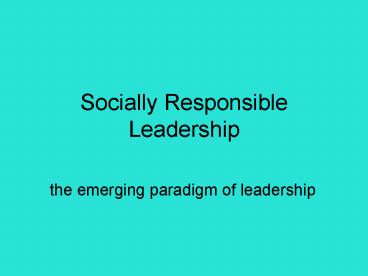Socially Responsible Leadership - PowerPoint PPT Presentation
1 / 13
Title:
Socially Responsible Leadership
Description:
The use of power and influence to mobilize forces to address a myriad of social issues ... the personal values they espouse. the values they instill within the company ... – PowerPoint PPT presentation
Number of Views:162
Avg rating:3.0/5.0
Title: Socially Responsible Leadership
1
Socially Responsible Leadership
the emerging paradigm of leadership
2
Socially Responsible Leadership defined
- The use of power and influence to mobilize forces
to address a myriad of social issues
3
- Why has the notion of social responsibility
become an issue for contemporary organizations? - What are the arguments for corporations and their
leaders assuming a more socially responsible
position?
4
The moral view
- Those who can, should
5
Can corporations be socially responsible and
profitable?
6
- Business is integrally connected to both the
social context in which it operates and the
natural environment on which - it depends.
7
The practical view
Each corporation is part of an ongoing, dynamic
system. Whatever problems are residing in that
system will eventually become the problems of
each corporation.
8
- Operating in a socially responsible manner helps
the organization externally
- enhances the organizations image and identity
- gives the organization legitimacy in the eyes
of the environment
- certain external stakeholders will want to
support the organization and ensure its
survival
9
- Operating in a socially responsible manner helps
the organization internally
10
How does working for a socially responsible
organization influence employees?
- Increases their intrinsic sense of motivation and
sense of purpose
- Enhances sense of value and impact they have
- Increases sense of pride in their work
- Enhances organizational commitment
11
What characterizes a socially responsible
leader?
- a clear understanding of core personal values
(and they are honorable) - credibility/integrity
- ability to see issues from a systems
perspective - sense of accountability / responsibility
- sense of power and control (and willingness to
use it in a positive sense, in service to
others)
12
Leaders shape corporate sense of social
responsibility by creating a clear corporate
vision that incorporates constructive end values
involving social responsibilityand enlisting
people in that vision
13
- Leaders shape corporate sense of social
responsibility by the culture they create
- the behaviors they model
- the personal values they espouse
- the values they instill within the company
- the processes they put into place (e.g. the
behavior they reward)
- who they hire, who they fire
- stories, symbols, language

